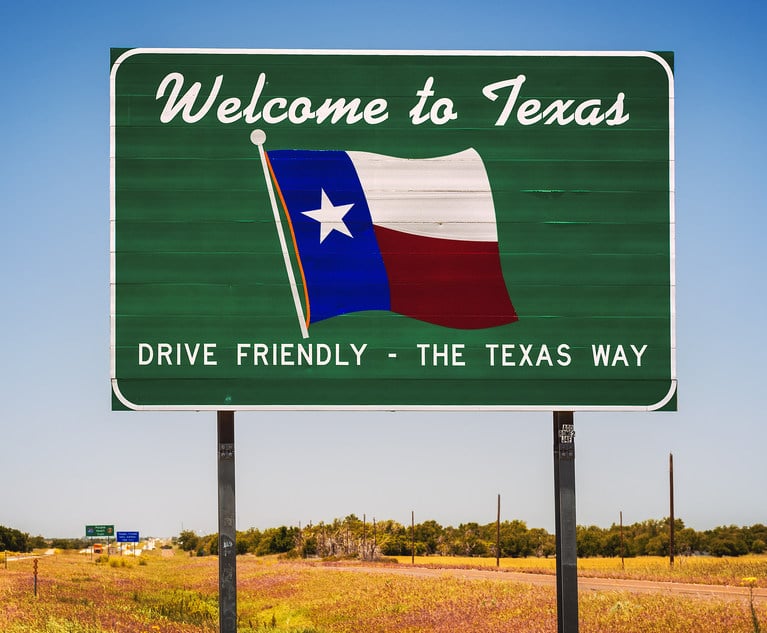 Guy Halgren, Sheppard Mullin. (Photo: Jason Doiy / ALM)
Guy Halgren, Sheppard Mullin. (Photo: Jason Doiy / ALM)Sheppard Mullin Revenue Jumps 13% Amid Growth in Equity Tier, Texas Launch
The firm grew its revenue to $799 million and saw its profits per equity partner rise 6.6% last year.
March 03, 2020 at 06:58 PM
5 minute read
The original version of this story was published on The Recorder
Los Angeles-founded Sheppard Mullin grew its revenue more than 13% last year and saw its profits per equity partner rise 6.6% to $1.8 million, even as the firm's equity partnership tier expanded.
Chairman Guy Halgren credited the firm's growing Dallas office and high lawyer productivity for the rising bottom and top line.
As gross revenue reached about $799 million, the firm's revenue per lawyer crossed $1 million, growing 3.4% from the year before. The firm's head count expanded by 9.2% to 780 lawyers.
Even as its equity partner head count rose by 7.1%, Sheppard Mullin's net income rose 14.1%, from $236 million to $269 million.
Halgren said the firm's investments in 2018, like its Dallas office and its robust head count growth, "really came home in 2019."
 Noting that the firm's revenues have been growing for 29 years running, he said, "we're really proud of our consistency."
Noting that the firm's revenues have been growing for 29 years running, he said, "we're really proud of our consistency."
He said that 2020 is off to a strong start, with lawyers "as busy, if not busier, than they were last year." Revenue this year may not be up as much, he said, "because we didn't hire as many people in 2019 as we did in '18, so we aren't going to get that same push."
The firm had more partner arrivals than departures last year, but it closed its Beijing office in April. Halgren said the firm had a vibrant China practice centered on corporate and intellectual property work but said it could continue to serve clients by consolidating in Shanghai.
Sheppard Mullin also became one of a few Am Law 100 firms to boast a cannabis practice last summer. Halgren wouldn't share details of its performance but said clients include investors and technology companies. One client is MassRoots, a publicly traded cannabis social network, which turned to Sheppard Mullin for corporate and IP work.
The firm's litigators—who typically account for about 55% of its business, Halgren said—fought several big intellectual property cases. They notched a victory for the publisher of a reference book on Picasso's works, convincing a California judge to decline to honor a 2 million euro French judgment because it was inconsistent with U.S. copyright policy. They also represented Swiss tech firm u-blox in patent litigation against InterDigital that was settled in November and worked for car parts supplier Continental in litigation related to Nokia patents.
Other firm matters included a case for BJ's Restaurants over the cost of non-uniform work clothing that stretched on for five years before the company prevailed. The firm also represented Sonic Corp. in responding to and litigating a data breach that impacted its drive-in restaurants and won a reversal of Huntington Park, California's moratorium on charter schools.
On the national stage, the firm helped Deloitte Consulting defend a $65 million award from the Department of Homeland Security and internationally, Sheppard Mullin lawyers helped their client, investor Viorel Micula, overturn a decision by the European Commission relating to its state-aid rules in his long-running dispute with Romania.
Sheppard Mullin went to bat for clients in the entertainment industry. One high-profile case was its representation of Tom Petty's widow in litigation brought by his daughters that reportedly settled late last year.
Music, TV and movies also appeared in the firm's deals column. The firm represented Amazon Studios in several projects and worked for Lionsgate Entertainment Group in its joint venture with Point Grey Pictures. Its lawyers also helped Mastercard negotiate a sponsorship agreement with Riot Games, the studio behind the online hit League of Legends.
Other transactional representation included work for Arlington Capital Partners on its sale of Quantum Spatial for $302.5 million and GoldenTree Asset Management in its $392.5 million acquisition of Syncora Holdings. In the real estate industry, the firm represented Moffett Place LLC in a lease of 2 million square feet to Google and its land-use lawyers worked on Los Angeles' $1.5 billion Angels Landing megaproject.
Speaking on the firm's diversity efforts, Halgren said the firm has studied what helps women and lawyers of color be successful and has introduced new programs to try to diversify its partnership. It was one of 64 firms that was "Mansfield 2.0" certified last September and was recognized for gender equality and family-friendly policies.
Sheppard Mullin tallied 15 lateral partner additions and eight departures, with most of the new hires in its intellectual property and business trial practices. Its Washington, D.C., office added four partners, including Thomas Dillickrath from the Federal Trade Commission and other partners in antitrust and intellectual property. In San Francisco, the firm added two business trial litigators, Elizabeth Frohlich and Christopher Van Gundy.
Halgren said Sheppard Mullin had a high success rate with laterals—about 90% are still around after five years, he said, compared to 60% for the legal industry—because of the firm's due diligence. About 65% of the lateral partners who joined since 2001, when Halgren became the firm's chairman, are still around, he added.
This content has been archived. It is available through our partners, LexisNexis® and Bloomberg Law.
To view this content, please continue to their sites.
Not a Lexis Subscriber?
Subscribe Now
Not a Bloomberg Law Subscriber?
Subscribe Now
NOT FOR REPRINT
© 2024 ALM Global, LLC, All Rights Reserved. Request academic re-use from www.copyright.com. All other uses, submit a request to [email protected]. For more information visit Asset & Logo Licensing.
You Might Like
View All
'Further Investment in Power' Will Drive Big Law Business—But What About Clean Energy Projects?
6 minute read
Legal Departments Gripe About Outside Counsel but Rarely Talk to Them
4 minute read
As Profits Rise, Law Firms Likely to Make More AI Investments in 2025

Law Firms Mentioned
Trending Stories
- 1Call for Nominations: Elite Trial Lawyers 2025
- 2Senate Judiciary Dems Release Report on Supreme Court Ethics
- 3Senate Confirms Last 2 of Biden's California Judicial Nominees
- 4Morrison & Foerster Doles Out Year-End and Special Bonuses, Raises Base Compensation for Associates
- 5Tom Girardi to Surrender to Federal Authorities on Jan. 7
Who Got The Work
Michael G. Bongiorno, Andrew Scott Dulberg and Elizabeth E. Driscoll from Wilmer Cutler Pickering Hale and Dorr have stepped in to represent Symbotic Inc., an A.I.-enabled technology platform that focuses on increasing supply chain efficiency, and other defendants in a pending shareholder derivative lawsuit. The case, filed Oct. 2 in Massachusetts District Court by the Brown Law Firm on behalf of Stephen Austen, accuses certain officers and directors of misleading investors in regard to Symbotic's potential for margin growth by failing to disclose that the company was not equipped to timely deploy its systems or manage expenses through project delays. The case, assigned to U.S. District Judge Nathaniel M. Gorton, is 1:24-cv-12522, Austen v. Cohen et al.
Who Got The Work
Edmund Polubinski and Marie Killmond of Davis Polk & Wardwell have entered appearances for data platform software development company MongoDB and other defendants in a pending shareholder derivative lawsuit. The action, filed Oct. 7 in New York Southern District Court by the Brown Law Firm, accuses the company's directors and/or officers of falsely expressing confidence in the company’s restructuring of its sales incentive plan and downplaying the severity of decreases in its upfront commitments. The case is 1:24-cv-07594, Roy v. Ittycheria et al.
Who Got The Work
Amy O. Bruchs and Kurt F. Ellison of Michael Best & Friedrich have entered appearances for Epic Systems Corp. in a pending employment discrimination lawsuit. The suit was filed Sept. 7 in Wisconsin Western District Court by Levine Eisberner LLC and Siri & Glimstad on behalf of a project manager who claims that he was wrongfully terminated after applying for a religious exemption to the defendant's COVID-19 vaccine mandate. The case, assigned to U.S. Magistrate Judge Anita Marie Boor, is 3:24-cv-00630, Secker, Nathan v. Epic Systems Corporation.
Who Got The Work
David X. Sullivan, Thomas J. Finn and Gregory A. Hall from McCarter & English have entered appearances for Sunrun Installation Services in a pending civil rights lawsuit. The complaint was filed Sept. 4 in Connecticut District Court by attorney Robert M. Berke on behalf of former employee George Edward Steins, who was arrested and charged with employing an unregistered home improvement salesperson. The complaint alleges that had Sunrun informed the Connecticut Department of Consumer Protection that the plaintiff's employment had ended in 2017 and that he no longer held Sunrun's home improvement contractor license, he would not have been hit with charges, which were dismissed in May 2024. The case, assigned to U.S. District Judge Jeffrey A. Meyer, is 3:24-cv-01423, Steins v. Sunrun, Inc. et al.
Who Got The Work
Greenberg Traurig shareholder Joshua L. Raskin has entered an appearance for boohoo.com UK Ltd. in a pending patent infringement lawsuit. The suit, filed Sept. 3 in Texas Eastern District Court by Rozier Hardt McDonough on behalf of Alto Dynamics, asserts five patents related to an online shopping platform. The case, assigned to U.S. District Judge Rodney Gilstrap, is 2:24-cv-00719, Alto Dynamics, LLC v. boohoo.com UK Limited.
Featured Firms
Law Offices of Gary Martin Hays & Associates, P.C.
(470) 294-1674
Law Offices of Mark E. Salomone
(857) 444-6468
Smith & Hassler
(713) 739-1250










